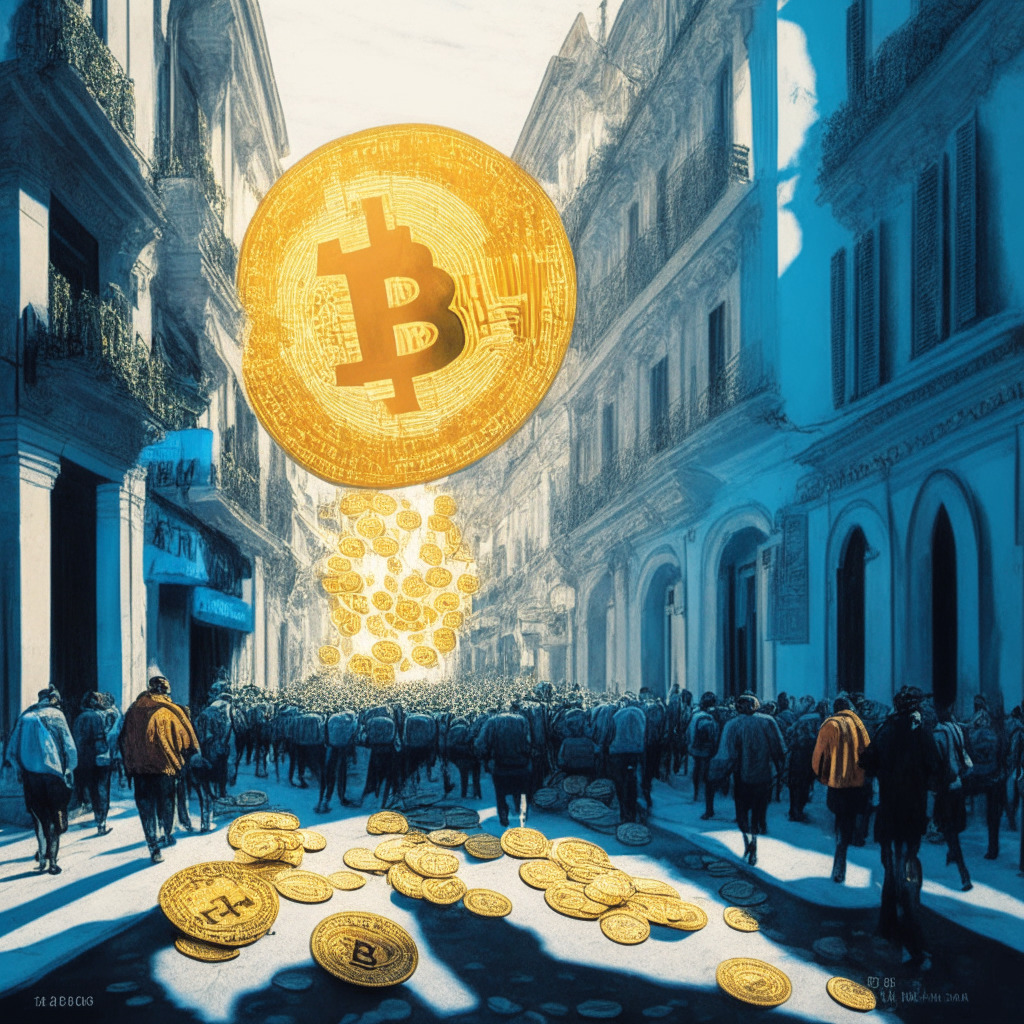“Media companies grapple with the use of AI technologies like OpenAI’s ChatGPT. While some, including CNN and the New York Times, have implemented measures to prevent AI’s access to their content, others like Netflix explore AI’s potential. Amid potential and risks, businesses tread the road ahead cautiously.”
Search Results for: bank of america
Examining Bitcoin’s Future: Corporate Involvement and Market Dynamics Amidst Price Surge
“The future of Bitcoin holds a blend of custodial and self-sovereign methods, with market adjusting to the effective mix. Key factors for Bitcoin custodians are technical, political, and natural. If BTC surges above $30,200, it could potentially reach $30,600-$31,000.”
Balancing Bitcoin’s Future: Centralization, Innovation and Regulatory Choices
“Michael Saylor, CEO of MicroStrategy, believes that the increasing centralization of Bitcoin by corporations is beneficial for technical, political, and natural reasons. He sees the future of Bitcoin involving a blend of institutions, individuals, centralizing, and decentralizing forces.”
PayPal’s New Stablecoin PYUSD: Exploring its Potential and Uncertainties
“PayPal’s recently unveiled stablecoin, PYUSD, is predicted to enhance payment efficiency. Despite optimism, reception may vary due to competition from central bank digital currencies and yield-bearing stablecoins. Current investors appear unbothered by the lack of yield and focus on safety and availability.”
Coinbase’s Earnings Exceed Expectations: A Deep Dive into Analysts’ Mixed Reactions
Cryptocurrency exchange Coinbase’s recent earnings surpassed expectations but major institutions raised concerns about its long-term growth potential. Issues include a lack of sustainable everyday utility value in the crypto industry, concerns about revenue diversification, and reduced transaction volumes. Despite this, Coinbase remains confident about its prospects.
Unveiling EU’s First Tokenized Equities: A Game-changer or a New Challenge?
Securitize has issued the first tokenized equities under the EU’s digital assets framework via the Avalanche smart contract network. These tokens represent equity in Mancipi Partners, a Spanish real estate investment trust. This move signifies a blending between traditional capital markets and crypto, potentially signaling a shift in the financial landscape that could see the tokenized assets market reach $16 trillion by 2030. However, this emerging sector requires careful navigation with thorough regulatory oversight.
Navigating the Balance Beam of Ambiguity: Crypto Regulations and the Ripple Effect
“An established regulatory framework is crucial for blockchain’s mainstream acceptance and institutional integration. However, recent US court rulings, like Ripple Labs case, haven’t provided clear implications, making the path to comprehensive regulation and understanding of digital assets complex.”
Navigating the Crypto Course amidst the United States’ Macroeconomic Shocks
The crypto market closely watches upcoming U.S macroeconomic events. Despite a favorable swing in the CPI, the US central bank sticks to hiking the interest rate. The hawkish financial stance affects crypto prices, increasing investor concerns about central bank overreach. Other significant influences include retail sales, industrial productivity, home sales, and weekly jobless claims data.
Ripple’s Legal Win: A Game Changer for Crypto or a Temporary Relief?
A recent court ruling may open new paths for Ripple and its cryptocurrency, XRP, particularly in cross-border transactions. If XRP is not classified as a security, it has the potential to reshape transactions within financial institutions. However, Ripple’s ongoing legal battles and stifling regulatory environment still evoke uncertainty, making crypto-investment a potential tightrope walk.
Bitcoin’s Precarious Balance: The Impact of Coinbase Account Termination and SEC vs. Ripple Saga
Bitcoin’s market position returns to its strong support level of $30,000 amidst user claims of terminated bank accounts due to Bitcoin transactions. Regulatory complexities regarding XRP’s status and ongoing crypto discussions heightens the anticipation surrounding Bitcoin’s next financial trajectory.
Bakkt Aims for International Expansion Amidst Unclear US Regulatory Landscape
Bakkt, a crypto-economy firm, expresses interest in expanding its operations to Hong Kong, the United Kingdom, and some European Union regions due to favorable regulatory environments. This follows Bakkt’s acquisition of Apex Crypto, leveraging partners like Webull, Public.com, and Stash to facilitate global growth. However, pesky regulatory uncertainties in the U.S. complicate alliances and force delisting of certain cryptocurrencies.
$27 Trillion Institutions Eye Crypto: Excitement or Skepticism for Blockchain Future?
At least $27 trillion of assets managed by major U.S. financial institutions, including BlackRock, Fidelity, and Goldman Sachs, are actively seeking to provide clients with exposure to Bitcoin and crypto. However, only a tiny portion would likely be allocated to crypto investments, and skepticism remains regarding the potential impact of institutional interest on the market and technology.
Digital Assets Lagging Behind Nasdaq: Diving Deep into Regulatory and Technological Impacts
Despite digital assets lagging behind the Nasdaq stock index, blockchain technology and tokenization are anticipated to significantly transform various sectors in the next 5-10 years. Balancing investor protection and fostering innovation will be key to shaping the future of digital assets and the blockchain ecosystem.
Tokenization Revolution: Taurus, Polygon & the Future of Mainstream Finance
The partnership between Swiss digital asset infrastructure provider Taurus and Ethereum scaling network Polygon highlights the growing traction of blockchain technology and tokenization within mainstream finance. With numerous financial institutions seeking blockchain-agnostic and token-agnostic infrastructure, the landscape will continue to evolve, attracting players from various sectors and revolutionizing asset management solutions while addressing security, scalability, and compliance concerns.
US Default Risk Looms: Stock Market and Crypto Impact, Market Turbulence Ahead?
The US debt ceiling deadlock poses a significant threat to financial markets worldwide; however, the stock and crypto markets remain relatively unaffected. JPMorgan warns of potential volatility surge as the default deadline approaches, which could impact the cryptocurrency market and influence Bitcoin’s support level.
Rising Popularity of Tokenized Money Market Funds: Boon or Bane for Crypto Market Stability?
The surge in popularity of tokenized money market funds indicates a shift in the perception and utilization of crypto investments. Offering relatively safe ways to earn a yield, these funds attract digital asset investment funds, crypto companies, and DAO treasuries, signifying a continued merging of blockchain technology with traditional finance.
Debt Ceiling Increase: How Bitcoin Could Face Losses Amid Rising Treasury Liquidity
Bitcoin could face losses in Q3 2023 due to the expected agreement on raising the U.S. debt ceiling, which might increase Treasury’s liquidity and impact risk asset markets, including cryptocurrencies. Bitcoin may struggle to reclaim yearly highs, with prices likely ranging between $20,000-$30,000 unless a new narrative or significant catalyst emerges.
Apple and Others Ban ChatGPT: Balancing AI Innovation and Data Security Concerns
Apple recently restricted the use of ChatGPT and other AI tools, fearing potential exposure of sensitive data. Other major companies like Samsung, JPMorgan, and Goldman Sachs have also prohibited internal use of generative AI, while simultaneously developing their own applications.
Samsung and BOK’s CBDC Collaboration: Advancements, Challenges, and Security Concerns
Samsung Electronics partners with South Korea’s central bank, Bank of Korea, to explore central bank digital currency (CBDC) for offline payments via NFC on Samsung devices, advancing global offline CBDC technology amid challenges and security concerns.
Samsung’s AI Ban: Balancing Innovation and Data Security Amidst Rising Industry Concerns
Samsung temporarily bans generative AI tools like ChatGPT for its employees, citing growing security risks and instances of sensitive code being uploaded. The company is reviewing security measures to ensure a safe environment for generative AI usage while urging employees to refrain from submitting company information on personal devices.
The Final Rate Hike Showdown: US Federal Reserve’s Last Stand for 2023?
After the recent increase in the federal funds rate, the U.S. Federal Reserve is expected […]
Kennedy’s Bold Crypto Agenda: An Independent Run for Presidency Powered by Bitcoin
“Robert F. Kennedy Jr., a Bitcoin supporter, announced his independent candidacy for presidency. Among his platforms is a positive stance on cryptocurrencies, including campaign finance via Bitcoin, tax exemptions for Bitcoin investors, and potential backing of the U.S. dollar with Bitcoin.”
Zimbabwe’s Gold-Backed Digital Tokens: A Game Changer or Double-edged Sword?
Zimbabwe’s central bank has introduced a gold-backed digital token, Zimbabwe Gold (ZiG), as a payment method. Physical gold tokens were introduced last year to entice local investors to invest in national assets. The digitization aims to expand value-preserving instruments and facilitate investment versatility. The strategy’s success, amid socio-economic complexities and inflation, remains uncertain.
CBDCs: A Cornerstone for Future International Monetary System & the Tokenization of Finance
The Banque de France views central bank digital currency (CBDC) as a crucial component for the new international monetary system, enhancing cross-border payments. It’s being considered from an international perspective right from the outset. Two potential development pathways include building interoperability with legacy systems and creating regional or international platforms for CBDCs.
Riding the Bitcoin Rollercoaster: Battling Regulatory Scrutiny and Market Volatility
Despite the recent 1.5% plunge of Bitcoin to $27,593, there remains positive investor momentum, even amidst increased scrutiny on digital assets from US regulators. While the volatility of the cryptocurrency market is highlighted, optimism prevails with promising ‘Uptober’ predictions.
Russian Legislator Predicts Global Foray of Digital Ruble by 2025, Possible Shift in International Trade
A high-ranking Russian legislitor, Anatoly Aksakov, predicts that domestic corporations will utilize the nation’s digital ruble, a Central Bank Digital Currency (CBDC), by 2025, especially in Latin American nations. He also suggested potential usage could transform “mutual settlements” among these nations.
Inflation, Interest Rates, and the Unpredictable Balance: Unraveling the Federal Reserve’s Challenges
The recent data from U.S. Bureau of Economic Analysis shows a decrease in the core PCE inflation index to 3.9% in August, leading to positive investor sentiment. However, potential monetary policy shifts and hints of rate hikes to control inflation cause market sensitivity. Increasing energy prices and inflation uncertainties further complicate Federal Reserve’s monetary policy considerations.
Global Crypto Regulatory Trends: A Challenge or an Opportunity?
Recent global legislative actions are intensifying cryptocurrency regulation discussions. Hong Kong is focusing on regulated exchanges to decrease fraud-related investor losses, Thailand is taxing overseas crypto profits, Brazil is advocating for digital assets protection, and the U.K. and U.S. are developing bills targeting illegal crypto use and curtailing Central Bank Digital Currencies respectively. Regulatory changes highlight the balance between encouraging financial innovation and protecting citizens.
The Paradox of Bitcoin Adoption in an Inflation-Hit Argentina: An In-depth Analysis
In the struggling Argentine economy, Bitcoin’s domestic price has risen an impressive 38% in local currency despite internationally dropping 61.5% from its all-time high. However, given that the U.S. dollar keeps pace with local inflation, it underlines the complexities of employing cryptocurrencies as safe havens in economies crushed by inflation.
The CBDC Anti-Surveillance Act: Stunting Growth or Protecting Liberty in Crypto?
“The U.S. bill known as the ‘CBDC Anti-Surveillance State Act’ aims to prevent the Federal Reserve from issuing a central bank digital currency. This bill has sparked mixed emotions, with supporters seeing it as crucial for protecting personal liberties against state control, while critics argue it could stifle innovation and trust in digital currencies.”
Revolution in Blockchain: A Deep Dive into Coinbase’s Base and the Emerging FriendTech Phenomenon
Coinbase’s layer 2 blockchain, Base, has seen a surge in daily transactions due to FriendTech, a decentralized social network built on Base. Questions about sustainability and authentic user engagement of such platforms have risen. Meanwhile, potential market shock following the sale of tokens from bankrupt crypto exchange FTX may be avoided.
Ramp Network’s Integration of Pix: A Boon or Bane for Brazilian Crypto Landscape?
“Crypto startup, Ramp Network, has integrated Pix, a popular payment method initiated by the Central Bank of Brazil, aiming to ease the onboarding process into the cryptosphere for businesses and individuals across Brazil. This could create a significant shift in Brazil’s cryptocurrency environment.”































